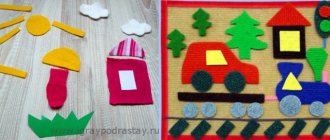How to raise a confident child
There is no absolutely correct answer to this question, because no two people, characters and personalities are the same. One thing remains unchanged - parental love. First of all, parents themselves need to be confident in the strengths and capabilities of their child. The upbringing model will take its origins from the example of the family in which the person was born, from memories of his own childhood. The baby should feel care and support from adults, and then the likelihood of low self-esteem will significantly decrease. Each parent chooses forms of education based on their feelings of correctness and necessity.
Approaches to nurturing correct self-esteem in children
All mothers and fathers would like to teach their child to be confident, so that he feels comfortable communicating with peers and adults, and, ultimately, finds his place in life. However, life throws up certain difficulties that you have to face at any stage of growing up.
Preschool age is the most favorable period to develop in a child such personality traits as perseverance and confidence.
A child is not born with a sense of self-confidence. His parents should teach him this. The task of parents is to teach their child to overcome life's difficulties. It is the parents, through their communication and trusting relationships in the family, who provide the child with an invaluable example of becoming a self-confident person who can cope with any life difficulties.
There are many recommendations for adults that help develop self-confidence in children, and the formation of personal qualities of girls and boys differs at different stages of their development.
| Boys | Girls |
| It’s easier to solve new problems, more difficult to solve typical ones. | The capacity of short-term memory is greater than that of boys aged 6-7 years. |
| React adequately to assessment of their performance. | They do not perceive praise as motivation for further action. For them, this is the result of activity, the end of the cycle. |
| When there is a shortage of time, they find the right solutions faster. | What is more important for girls is not the grade, but its emotional expression. |
| Analytical thinking, easily grasp complex stories. | They solve stereotypical tasks much better than new ones. |
| They absorb information about the action more effectively. A passive verbal dictionary has been developed. | They grasp the information received faster, but it is more difficult to relate it to the existing information. |
In preschool age, throughout all stages of a child’s growing up, these life difficulties can manifest themselves in such moments as:
1. Fear of being alone in the room, unwillingness to sleep without mom.
The habit of co-sleeping plays a big role here. It begins in infancy, when the mother does not really want to get up at night to calm or feed the baby. The best solution here is to put the baby next to you in bed. But over time, co-sleeping needs to be replaced with independent sleep, since the longer this decision is delayed, the more difficult it will be to fix everything later. According to psychologists, children should sleep separately in their own crib, if not from birth, then from an early age. The formation of one’s own “I”, separate from parents, consists of just such seemingly small moments! Sleeping without a mother develops independence, individuality, and self-confidence in the child.
2. The child’s inability to find contact with his peers, unwillingness to lose and admit defeat.
This question concerns almost all children. For everyone, the victory of another child becomes an unpleasant surprise. Some children cope with it easily and calmly, but for some it is a real tragedy. Parents should definitely prepare their children for such moments in life. For any mother, her baby is the best, smartest, most beautiful child in the world! In order for the child not to be disappointed, it is necessary to explain to him from an early age that he will not always be the winner! If you praise a child, then you need to clarify what exactly you praised for.
For example, “You are so neat! I ate it and didn’t get dirty at all!” or “You are my smart girl! She put on the blouse herself, without my help!” The main thing to praise is not the child’s personality, but the action he performs. This contributes to the formation of correct, not inflated self-esteem.
3. Fanatical guardianship and control by parents of their child.
Parents and grandmothers must provide the child with conditions in which he can demonstrate independence. Everyone understands that once a child joins a kindergarten or school, he finds himself in society and must function as a personal unit, separate from his loving mother or grandmother. In order for the baby to feel confident and there is no reason for the formation of low self-esteem, adults need to develop independence in the child from an early age.
4. Reluctance of parents to give the child the opportunity to make any decisions independently.
Every child models their future adult life on their childhood actions. It is very important to allow him to participate in any choice. Let it not be a really serious moment, maybe planned specifically for the child. The baby will already begin to feel significance and responsibility for his actions on a subconscious level.
5. Parents comparing their child with some more successful child.
Sometimes every parent has ever said to their child: “My friend’s daughter is already reading and writing, but nothing interests you.” Of course, it seems that such words motivate the child to work harder, but they leave a completely different imprint on the child’s psyche. Children do not yet have as developed a sense of competition as adults. For them, such words will only develop self-doubt and reluctance to strive for something new. A well-known fact: a child can only be compared with his own achievements, without involving third parties. Moreover, do not remember yourself at this age.
All this and much more contributes to the development of a child’s insecurity.
Important conditions for the formation of a self-confident personality
There are many recommendations for adults that help increase self-confidence in children.
- Avoid a vicious circle. First of all, start with yourself. Insecure parents cannot have self-confident children.
- Do not form a negative attitude towards yourself in a child with expressions such as: “Woe is my onion”, “Not a child, but 33 misfortunes!” etc.
- Develop self-service and independence skills. The more independent a child is, the more confident he is in his abilities.
- Develop the child's creative abilities. Help you decide on the type of activity you like best. This will help the baby increase his self-esteem.
- See your child as a person worthy of respect. Accept your child as he is, without comparing him to anyone.
- Support and praise the child in his endeavors. The child must see this support and interest in his activities.
The problem of self-confidence is the basis for the harmonious development of a child’s personality, and the formation of the personal qualities of girls and boys differs at different stages of their development.
Suppressed independence
Sometimes parents want to make life easier for their child so much that they do everything for him, ignoring even the very first manifestations of independence and the child’s statements “I do it myself!” With this approach, you can raise children who do not know how to cope with difficulties and constantly expect help from their parents.
To raise a confident child, teach him to solve problems independently and take responsibility. Be there, support and help, but never take the initiative. Let him be the first to try to figure out the problem. In cases where the child does not know what to do at all, offer several solutions and let him choose himself - this way he will still have the last word.
Give your child simple tasks and demand they be completed. Delegate to him household chores that are feasible for his age. He will feel your trust, know that his help is needed, and at the same time his self-confidence will grow.
Developing confidence in girls
The key to developing self-confidence in a girl is the need to perceive her as a person with only good qualities.
- You need to often remind the girl that she is kind, smart, beautiful, and has a good character. It’s good if a father calls his daughter “my princess”, “my beauty”. This gives the girl the understanding that she is loved, appreciated and gives her self-confidence;
- The most important person for a daughter is her mother. She is the role model. When instilling the most important qualities of confidence in your daughter, you need to demonstrate them by your own example. Girls from an early age imitate their mothers, try to try on their mother’s clothes, shoes, apply makeup, paint their nails;
- From an early age, it is necessary to tell your daughter how relationships between people work. Help her understand that sometimes she will be pushed away, not everyone will want to be friends, and this should not be a reason for her to harbor sadness and distrust of the outside world within herself;
- Get your daughter interested in additional activities and offer to sign up for clubs. Every child has predispositions for various types of art; you just need to make an effort and develop them. Parents should help with this. When a girl practices dancing or music, she stands out among her peers. Self-confidence increases as character traits become stronger;
- During adolescence, a girl will have to face interpersonal problems. From an early age, a mother needs to win over her child so that her daughter can seek advice without embarrassment or fear. And together it would be much easier to cope with the current situation.
Other people's assessments are often biased
Too often we trust other people's opinions about the child. Someone else's assessment should be considered as made in a different place and at a different time. Accounts of a child's misbehavior from a classmate, a neighbor, or the teacher who taught the class last year usually do not include any mention of their own position or the circumstances that provoked the child's reactions.
Behavior is inseparable from its relevant context; Before you judge, evaluate, and respond to behavior, understand the conditions that cause it.
Let's look into the classroom. Little Alfred does not pay attention to the teacher. What's wrong with him? Impaired cognitive processes? Behavioral difficulties? Distraction of attention? In fact, Alfred, immersed in his fantasies, enjoys revenge: he imagines the teacher’s funeral. "What a nightmare!"
Dr. Alice Ginot, a psychotherapist who is especially sensitive to adults’ misunderstanding of children, analyzes the reasons for Alfred’s ominous fantasies:
“When the teacher told everyone to sit down, Alfred hesitated. She turned to him and shouted: “Alfred, what are you waiting for? Special invitation? Why are you always last? Why does it take you so long to get into your seat? Are you naturally this slow, or is something stopping you?’ While Alfred sat down, the whole class laughed at him.”
As we can see, it is not surprising that Alfred would like to punish the teacher. But his righteous anger seems to have resulted in an unjustified sense of guilt. And the teacher did not intend to humiliate him. She was just doing her job, following the routine, maybe staying up during class, etc.
When analyzing a child’s behavior, you should cover all external conditions and circumstances in as much detail as possible. Be sure to celebrate the role you played. Before introducing this data to others or including it in your personal file, be sure to take into account the child’s own version. It is possible that your versions do not even overlap in some way. Remember that any judge will be more impressed by the adult version. Compensate for this effect by paying increased attention to the other side, to how this world looks from the other end of the telescope.
Developing Confidence in Boys
In the development of self-confidence in boys, the role of the father of the family is very important, who must raise in his son a real man who is not afraid of difficulties, who knows how to do any man’s work, who knows such concepts as conscience and honor. Someone who knows how to be friends and love and treat a woman with respect.
When adults treat their children with love, children are sure that they are loved. And, conversely, if adults treat them badly, humiliate, ridicule, insult them, then children also feel bad. They will be angry, bullied and unsure of themselves. And this is unacceptable. It must be remembered that the child’s self-esteem, i.e. awareness of one's strengths and weaknesses depends on the attitude of parents towards their children. In building a boy’s self-confidence, parents need to help develop the following qualities:
- Independence. What is meant here is not the material or physical side, but the ability to make decisions and think independently. Independence is synonymous with confident behavior; this quality helps to quickly establish contacts and resolve issues. A boy becomes an adult after he is able to make decisions and be responsible for his actions.
- Ability to perform correct analysis. The ability to draw a logical conclusion, analyze others and oneself, assess the situation correctly, see the difference between good and evil, and measure one’s capabilities.
- The ability to sympathize. Creating normal contacts in society and demonstrating the ethical side of a child’s personality also affects self-confidence.
Reluctance to learn to communicate
Let the child figure out his own relationships with peers - this is the position of non-interference. In fact, teaching children to communicate correctly is important. Explain how to make acquaintances, maintain a conversation, lead a discussion, answer calls. Teach in a playful way, simulating the desired situation.
And remember that a child learns how to behave in society by watching how their parents do it - set a good example.
When your child complains about conflicts, always listen carefully and tell him what to do correctly in each situation. If a child is called names and he becomes confused, communication skills guru Carol Fleming in her book “Talking is Easy! How to become a pleasant conversationalist by communicating confidently and at ease” suggests playing “Give the Badass a Thing”!
The rules are simple - the child voices what was said offensively to him, and all family members begin to offer their own options for responding to the offender. The main thing is not to think for long, but to try to quickly and resourcefully repel attacks. Thanks to the game, the child will be able to “calmly try different behaviors, emotions and different ways of speaking in the family circle.”
How to understand that a child is not confident in himself
This may be indicated by indirect signs, such as:
- the baby does not make eye contact when talking;
- stoops;
- irritable when communicating with other people, distrustful;
- has phobias and a number of fears;
- draws and writes very finely, pressing hard on the pencil;
- cannot meet people first, is shy;
- experiences fear of starting new things;
- has no opinion;
- often gets angry in front of strangers.
What to do to help your child
Here are some exercises that will help develop the determination of children aged 5-7, 8-9 years.
- Movements with music. Many children don’t like to dance because they think they don’t know how to dance, they are shy, they are not confident in their abilities and they think that they will look funny. It is enough to organize a small dance, learn simple movements with your child, and the baby will feel more comfortable.
- Creative activities. Role-playing games are great for developing determination. Organize a theater performance with your child. Let it first be a shadow theater, then a modest finger theater, a theater behind a screen, and then you can move on to a costume theater, where the child himself will be the hero.
- Word game. Invite your child to play with words using different letters of the alphabet. But this will not be an ordinary game! Words should denote the child's positive qualities. Start with yourself: “T” – hardworking, patient... what is your child like? You can organize such a game both in older preschool and school age.
At an older age, 10-11 years old, psychological training can be used with children to raise self-esteem. Children are more receptive to words and take more meaning from them. Capable of analyzing their actions.
All problems of a child’s self-esteem come from childhood; if you identify, prevent and choose the right way to develop children’s personal qualities in time, you can avoid many secondary problems arising from misunderstandings and help the child become confident and have friends.
Psychological reasons for a child's lack of self-confidence
The reasons for children's insecurity can be different - each case is individual. However, it is worth highlighting the most common ones. And at the center of these reasons are always parents.
- Unflattering statements addressed to a child. Expressions such as “you won’t succeed anyway” and “you’re doing everything wrong” are one of the reasons for low self-esteem. What else you can’t tell your child so as not to program him for failure, read in this article.
- Devaluation of the needs and desires of the student. This does not mean that you need to fulfill all your children’s whims at the first call. However, the more often parents ignore requests, the less important the child feels. more about the authority of adults and how to properly gain it from a student here.
- Focus on failure. Many parents forget that both their son and daughter can and should be praised. Adults are used to swearing for wrongdoing, but this is not the only way to communicate with their baby.
- Parental faux pas. Sometimes adults do not think that a child is a person. Therefore, he does not deserve humiliation and insults.
Several signs indicate a child's lack of self-confidence: isolation and secrecy, unsociability, timidity, imitation of others, inhibition, stubbornness, low self-esteem and loneliness.
The most important thing is to discern the emergence of such qualities in the early stages. The older the child becomes, the more difficult it will be to deal with his insecurities.









